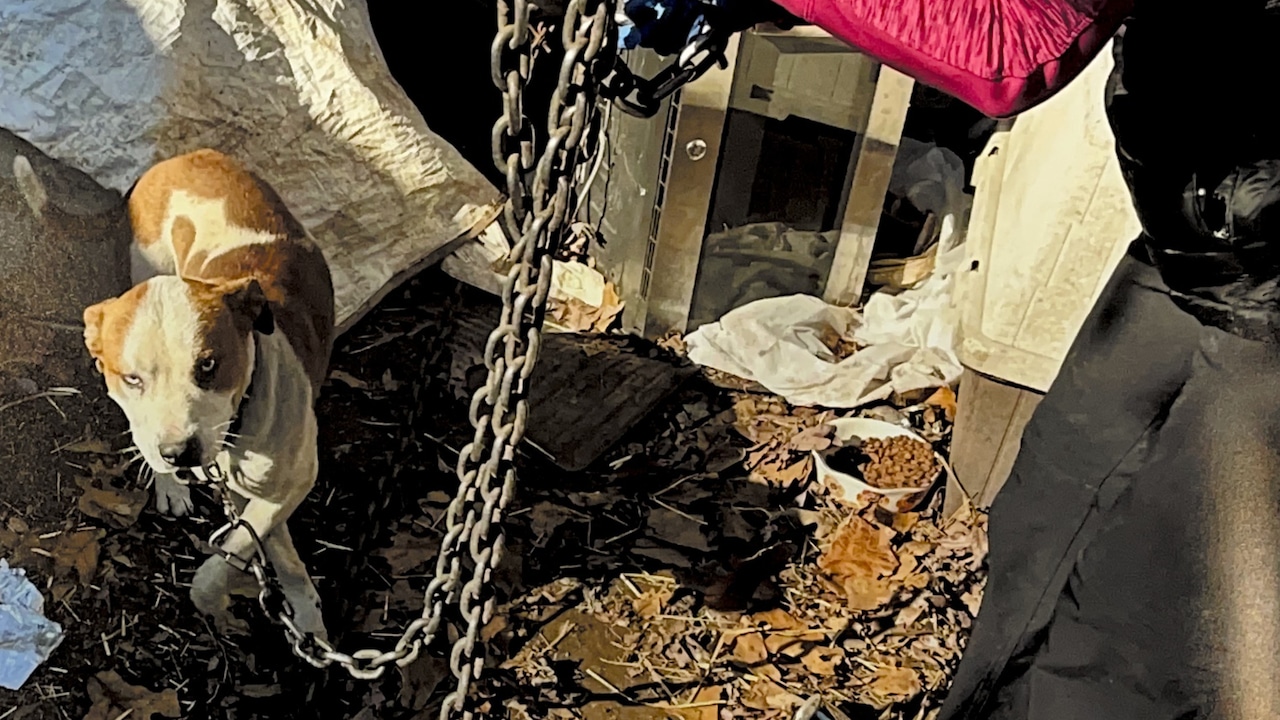Dianne Rogers saw a chained dog in Madison County last month, and the scene deeply affected her.
After 16 years in Charlotte, North Carolina, Rogers moved to Madison County in 2022. When she saw a chained dog at a location less than a 10-minute drive from her house, she decided to do something about it.
“There’s a skinny, skinny dog and I drove by there and obviously the owner doesn’t have any money,” Rogers told AL.com. “The only reason why I got involved was because I felt bad for the dog.”
After seeing a post on Nextdoor, a neighborhood social media platform, Rogers dropped off “four big bags of dog food” in December, thinking one chained dog lived at the property. More Nextdoor posts showed her that at least two other dogs were chained there, prompting a second visit.
AL.com is not disclosing the dog’s location or owner because of privacy concerns.
“He’s got puppies in the house running around, he’s got dogs chained up out back, he’s got a mama dog outside separate,” Rogers said. “The dogs are like living in their own poop and stuff, and they had no clean water whatsoever.”
Rogers and other women who lived nearby repeatedly visited the location to feed and water the dogs. One of them cleaned up the feces, and an organization called Helping Animals Without Shelter brought bedding straw. Rogers noticed the dogs were no longer there at the beginning of the year, suggesting their complaints may have had an effect.
Rogers and other concerned residents relayed their concerns about animal welfare, including requests for laws prohibiting dog chaining and other issues, to Madison County legislators this week.
Madison County Animal Control officers told AL.com that they cannot act against dog chaining because it’s legal, despite the women’s push for action. Madison County Animal Control covers the county areas outside Huntsville and Madison cities. Madison County should not be confused with its namesake, the city of Madison.
Brad Stewart, director of Madison County Animal Control Department, told AL.com that he is aware of the location Rogers and others visit and is actively monitoring the situation, but the food the advocates provide the animals means they are looking better than before, reducing any urgency to remove the animals.
“Whenever the dogs are being provided for, they’re being fed and watered, the owner doesn’t have to actually stay there,” he said. “And I think we got some citizens of the community going by and feeding them too; they shouldn’t do that.”
A few miles away from that Madison County location, in Huntsville, stricter animal cruelty laws require owners to provide clean drinking water, food, and adequate shelter. The shelter must be free of accumulated feces, water, or mud. Madison County does not have such requirement.
Stewart, who previously worked with Huntsville Animal Services, noted that dog chaining like that seen in that Madison County location is prohibited within city limits. Huntsville requires dogs and cats to be kept in temperatures between 40 and 90 degrees.
“We had to go around scan temperature inside the houses sometimes when it was cold,” Stewart said.
“…they can’t be on a chain at all,” he added, concerning dogs in Huntsville, noting that the water must not be in a place where the animals can tip it over.
“And if you don’t live there, you can’t have the dogs there because if the power’s not on and the property’s condemned, the animals can’t remain on that property,” Stewart added. “So we’ve just got two different entities.
But Rogers and other animal advocates, in separate interviews with AL.com, warn that chained dogs in the unincorporated part of the county, those not within the cities of Huntsville and Madison, face multiple risks: attacks from coyote packs, exposure to freezing winter temperatures, and the danger of hanging.
Sue Cummings, a retired marketing executive, discovered a dog had died from hanging from its chain in Madison County some years ago. That incident is close to her mind as she participated in her current advocacy.
“I tried to rescue a puppy, a German Shepherd, many years ago that was tethered, and Animal Control simply put a note on the door,” she said. “The dog ended up hanging himself and was dead when I found it. He got caught between a fence. I was wondering why I couldn’t find him again. I found him dead.”
The advocates worry about dogs without rabies vaccination and license tags. But Stewart said his department can’t act as long as the animals stay on the property.
“State law, the way it’s read, if the canines remain on the property, we can’t enforce rabies or license,” Stewart said. “You can be on a chain and tethered as long as you’ve got food, water, and shelter.”
“Those people just want us to go and pick up this man’s dogs. We can’t do that,” he added.
Lisa Dutsch moved from Virginia to Madison County in 2022. This year marked her first involvement in animal advocacy.
“You can’t not see it,” she said. “You know, it’s just right there, and it’s the biggest heap of a thing I’ve ever seen in my life. It’s just an eyesore and the poor animals are…I’m an animal lover. I have been my whole life. I really can’t stop thinking about these poor animals and nothing gets done. And it’s really a shock to my system and I just felt like I really needed to do something.”
Alabama animal cruelty law makes intentional torture a first-degree felony and says it’s a misdemeanor offense if anyone “in a cruel manner” deprives “a dog or a cat of necessary sustenance or shelter.”
The advocates want Alabama to define “shelter” more clearly in state law, which counties must follow, to better protect the animals. Unlike cities, which can pass ordinances through their councils, Madison County is bound by the state constitution’s animal control law. Any additional law would require legislative approval.
“We need to be able to say this is adequate shelter promoting quality of life and this is not an adequate shelter,” said Deanna Nicholas, one of the advocates. She believes defining proper shelter and animal care would solve the problem.
Two longtime Huntsville animal advocates, Aubrie Kavanaugh and Karen Borden of No Kill Huntsville, said the problem extends beyond one location.
“It’s county-wide and it’s disgusting,” Kavanaugh said.
Borden, a Realtor, said people moving to Madison County find the treatment of animals to be a sore point. The county is one of Alabama’s fastest-growing and largest, and, in recent estimates, added more residents than other counties.
The Realtor acknowledges that dog chaining is legal in the county. “Unfortunately, this isn’t the only incident of this kind of thing that’s going on in the county, and a group of us are trying to put a stop to it, trying to get new legislation entered,” she said.
More people have been galvanized, she explained, because “many people drive that intersection on a regular basis and have been watching this go on,” seeing dogs chained at that Madison County location since summer.
“And we’re supposed to be this big progressive area, all this high tech, all these engineers, all these rocket scientists, all this, that and the other. And we’re building, building, building, but we still don’t know how to take care of our animals,” she said.
“It’s a disgrace.”
Animal welfare advocates, including Rogers, attended a forum on Jan. 6 at Huntsville City Hall where Madison County legislators heard recommendations from residents. Borden laid out three requests for a law that would apply only to Madison County: define shelter, prohibit dog chaining, and provide a better definition of animal neglect and abuse and when animals can be seized.
“We have many issues in Madison County regarding how animals are treated, but there are things that you, as our delegates, can do to separate Madison County from the rest of the pack and have standards of which we can all be proud,” Borden told the lawmakers.
Source link https://www.al.com/news/2025/01/madison-county-residents-fight-dog-chaining-officials-say-its-legal.html


